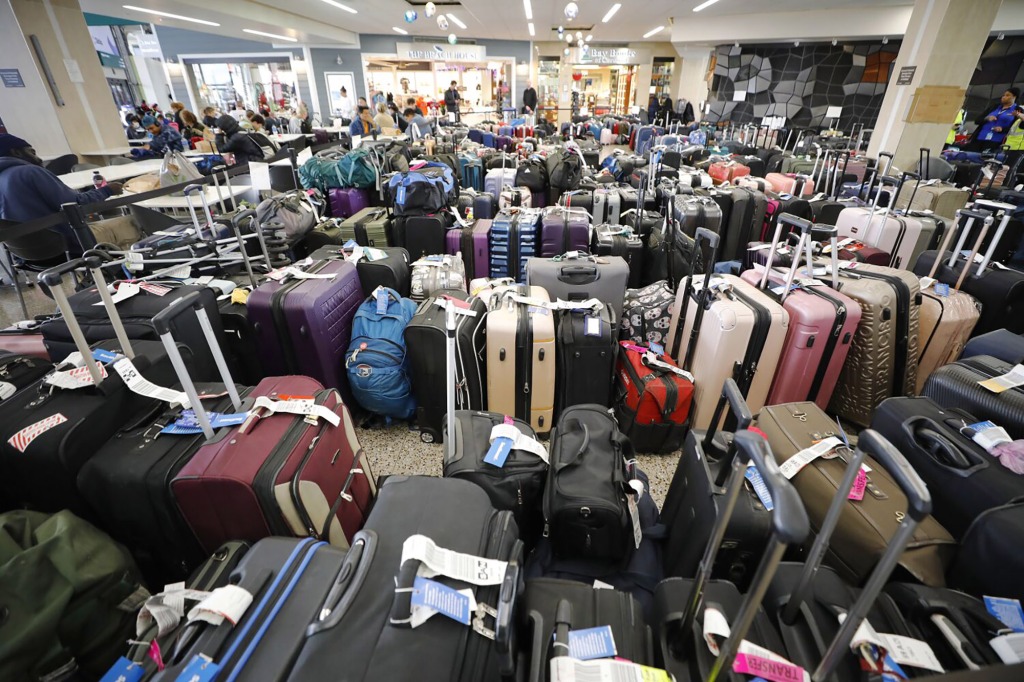[ad_1]
Pictures of travelers still marooned in airports over the long holiday week are deeply disturbing.
Passengers are missing flights, unable to rebook passage to visit with friends and loved ones. Thousands of pieces of luggage remain strewn about airport lobbies. Airline and airport employees still struggle with the anger and frustration of customers.
Some workers have broken down in tears after hours of dealing with disappointed ticket holders.
Thousands of flights, particularly those connected with Southwest Airlines, have been canceled. Southwest is the biggest carrier by far at Kansas City International Airport, and it has faced its share of chaos.
It may be days before the nightmare ends, and months, if ever, before passengers are made whole for their losses and inconvenience. If a flight is canceled, travelers are entitled to refunds. However, delays — even long ones — are a different issue. “Each airline has its own policies about what it will do for delayed passengers waiting at the airport; there are no federal requirements,” the U.S. Department of Transportation says on its website.
“Airlines have a lot of discretion in how they respond to problems,” DOT says. “While you do have certain rights as a passenger, your demands for compensation will probably be subject to negotiation.”
Some compensation will be impossible. How can anyone pay for a lost Christmas holiday, or a missed visit with family? It can’t be done.
What is possible — and is absolutely needed — is a full apology for the debacle, and a complete investigation into what went wrong.
The Christmas weekend is a naturally heavy-travel period, which provides a partial explanation. At the same time, the airlines could not have been unaware of travel demand: Almost all tickets are purchased in advance. If flights were deliberately overbooked, the public should know.
Weather clearly played a role. A devastating blizzard swept through the eastern third of the nation, causing havoc and death in several cities. Airports closed during the storms, causing a cascading problem with misplaced crews and ground workers unable to get to airports.
Analysts say Southwest may be particularly vulnerable to these disruptions. The airline’s apparent reluctance to reschedule fliers on competing airlines may have played a part as well.
The Department of Transportation said Monday it will look into Southwest’s decision-making. “The Department will examine whether cancellations were controllable and if Southwest is complying with its customer service plan,” the department said in a tweet.
We encourage a full-scale review of the holiday travel nightmare, with recommendations on ways to improve next time. We also urge Southwest, and other airlines, to ramp up efforts to voluntarily compensate ticket holders forced to rent cars or hotel rooms because of canceled flights.
Anyone who had to rent a hotel room, or car, because of any airline’s poor planning or response should be fully compensated.
There are a few caveats. The cost to travelers over the past week is critical, but it’s less important than safety. No lives should ever be risked in order to meet a travel schedule. It’s possible some problems were caused by prudence.
At the same time, airlines should show their plans for such contingencies. Did Southwest’s aggressive scheduling contribute to the debacle? Should the airline have intervened sooner? Are backup plans adequate? Has the airline failed to modernize, as its unions have alleged?
Do airlines need to improve customer relations? Should crisis plans be revised, and more people hired? Should airports do more to prepare for such events, and provide more services for stranded passengers?
In all of this, passengers will look to the federal government for answers. They should get them. At the same time, the nation decided decades ago to essentially deregulate air travel, making it harder for the government to oversee airlines’ decision-making.
Deregulation made flying cheaper. It helped create alternatives for travelers, including Southwest Airlines. It made service to big cities easier and more convenient.
But the concentration on the bottom line, rather than meeting public service requirements, has diminished the quality of air travel. It’s why you get a bag of peanuts instead of something better to eat when you fly.
In general, airlines care about revenue and spending more than passenger satisfaction. That’s true of lots of industries.
So the real answer to this week’s calamity rests only in part with the federal government. The other answer belongs to customers, who can and should vote with their pocketbooks and credit cards the next time they travel.
— The Kansas City Star via Tribune News Service.
[ad_2]
Source link





